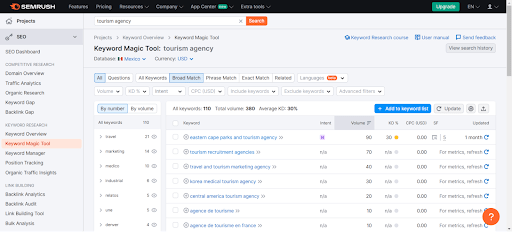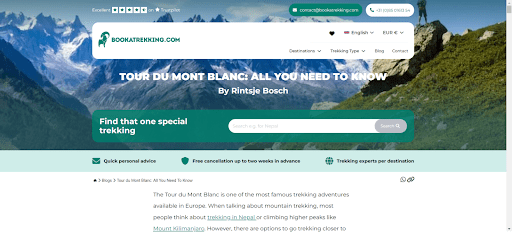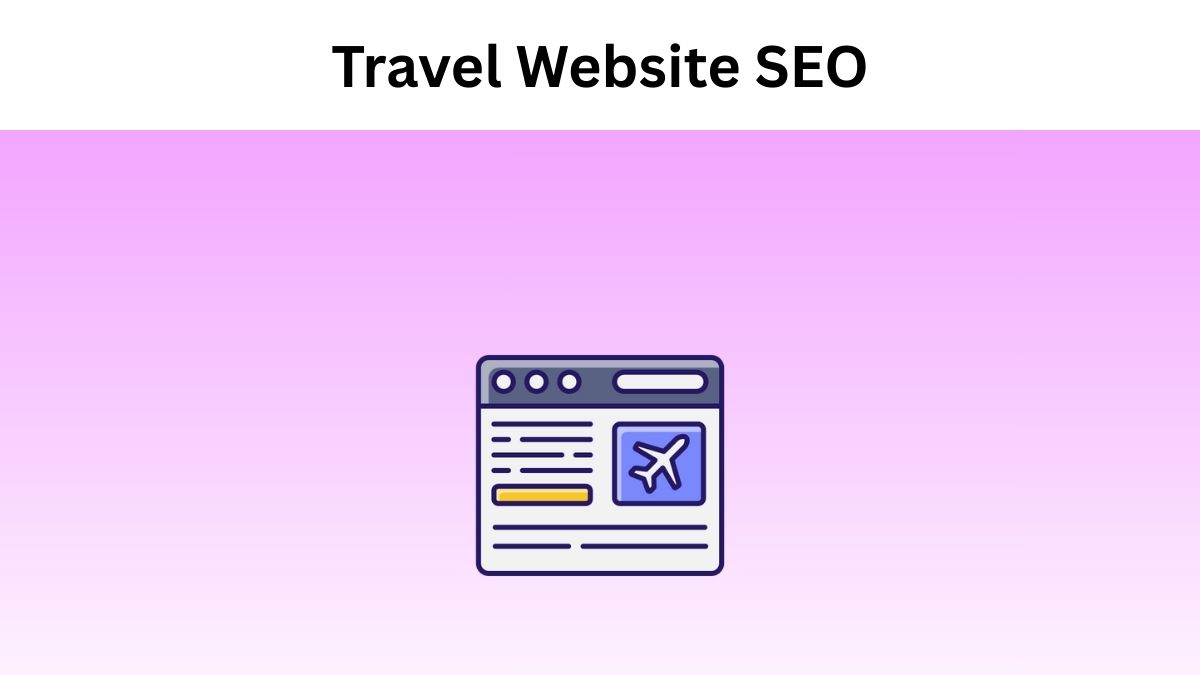In the ever-evolving digital landscape, having a strong online presence is paramount for any travel business to thrive. With countless destinations, tour operators, and accommodation providers vying for attention, optimising your travel website for search engines is no longer an option – it’s a necessity. Imagine potential customers effortlessly finding your offerings amidst the vast online realm, seamlessly guiding them to book their dream vacations with you. This is the power of travel website SEO, a strategic approach that can catapult your business to new heights of visibility and success.
This comprehensive guide will delve into the intricate world of travel website SEO, unveiling proven strategies and tactics to help you outshine your competitors and captivate your target audience. Buckle up as we navigate through keyword research, on-page optimisation, content creation, link building, and more, equipping you with the knowledge to transform your travel website into a commanding force in the digital realm.
Why is it so important? In this article, learn how to apply the right SEO tips to improve your travel booking website’s positioning, thus giving your business a well-deserved boost.
What is SEO, and why is it so relevant in tourism?
SEO (search engine optimisation) comprises several marketing and technology strategies that give a better positioning to your website. What does this mean?
Thanks to an SEO strategy, your travel booking website can appear in the first search results in engines such as Google, Yahoo, or Bing. This is done organically, without you needing to pay for advertising to appear at the top.
The relationship between tourism and SEO positioning
SEO is the main tool you should implement so that people looking for trips and routes worldwide can find your tourism offer and consider buying it. Look at it in the following way:
- Considering that 90% of people research online before planning a trip, having a good digital presence is crucial for travel agencies and tourism companies.
- Travel bookings made online account for 63% of the total revenue generated by the travel industry each year.
- A successful SEO strategy can attract just the right people to your site and generate a conversion rate of up to 14.6%.
The bottom line is that the travel industry is going through a major digital transformation, where people prefer to research online, and one of the best ways for them to find you is through SEO. However, many travel businesses also rely on booking platforms like WP Travel and FareHarbor for their reservations. If you’re looking for other options, exploring Fareharbor alternatives can offer you the flexibility to choose a system that best suits your specific business needs.
Why Travel Website SEO Matters
Increased Visibility and Traffic
With billions of searches conducted daily, optimising your travel website for search engines ensures that your offerings are front and centre when potential customers seek their next adventure. You’ll attract more qualified traffic by ranking higher in search results, translating into a higher likelihood of bookings and revenue generation.
Cost-Effective Marketing
While paid advertising can be effective, it can quickly become a financial burden, especially for small and medium-sized travel businesses. Conversely, SEO leverages organic search results, providing a more sustainable and cost-effective marketing strategy in the long run.
Competitive Edge
Standing out from the crowd is crucial in the fiercely competitive travel industry. By implementing effective SEO strategies, you’ll gain a competitive advantage over businesses that neglect this aspect of online marketing, positioning yourself as a leader in your niche.
Improved User Experience
SEO encompasses more than just rankings – it’s also about delivering an exceptional user experience. By optimising your website’s structure, content, and functionality, you’ll create a seamless and engaging experience for your visitors, increasing the likelihood of conversions and repeat business.
Strategies for Travel Booking Website
Keyword Research: The Foundation of Travel Website SEO
Identifying and targeting the right keywords is the cornerstone of any successful SEO strategy. In the travel industry, keyword research is particularly nuanced, as travellers often use various search terms depending on their intent and stage of the planning process.

Understand Search Intent
Travellers’ search queries can range from general (“best beach destinations”) to highly specific (“luxury villa rental in Bali with private pool”). By understanding search intent, you can tailor your content and optimise for the keywords that align with your target audience’s needs and interests.
Leverage Long-Tail Keywords
While broad keywords like “travel packages” may have high search volumes, they can be incredibly competitive and challenging to rank for. Instead, focus on long-tail keywords, such as “affordable family-friendly resorts in the Caribbean,” which are more specific and often have lower competition yet still attract highly targeted traffic.
Similarly, if you provide location-specific services, focus on such specific keywords. For example, if you provide RV rentals in San Francisco, focus and optimise your page for that.
Utilise Keyword Research Tools
To uncover the most valuable keywords for your travel business, leverage powerful keyword research tools like Google Keyword Planner, SEMrush, Ahrefs, or Moz Keyword Explorer. These tools suggest relevant keywords and provide insights into search volumes, competition levels, and potential traffic estimates.
Also Read: How Digital Marketing Helps to Grow Your Business
On-Page Optimisation: Creating a Search Engine-Friendly Website
Based on this information, it is time to decide what to modify to get more people to visit and explore your website. This implies several activities, such as updating the current content and its figures, improving the loading speed, creating a landing page that converts, generating more multimedia and quality content, optimising the images, improving the user experience, etc.

Bookatrekking is a travel company that has mastered leveraging search engine optimisation (SEO) to enhance its online presence and engage with adventure seekers worldwide. With a keen focus on optimising its digital footprint, Bookatrekking continually updates its website with fresh, relevant content and ensures its information is current and accurate.
One of the key strategies employed by Bookatrekking is optimising its website’s loading speed, recognising the importance of providing users with a seamless browsing experience. By investing in efficient hosting and minimising unnecessary scripts and plugins, the company ensures visitors can quickly access the information they need without frustrating delays.
Furthermore, Bookatrekking understands the power of multimedia and quality content in capturing the imagination of its audience. The company generates captivating videos, stunning photographs, and informative blog articles about the Tour du Mont Blanc. Bookatrekking`s content inspires potential trekkers and contributes to its SEO efforts by enhancing user engagement and increasing dwell time on the site.
You can consult the Google Search Console service to see the indexing status of your URLs and analyse which ones are ranking and which ones you can optimise.
We believe in a future in which AI is not sidelining humanity. Instead, it’s about magnifying our capacities, merging machine efficiency with human warmth and creativity. At Travel AI, our ethos is simple yet profound: One Vision, Infinite Possibilities.
Optimise Page Titles and Meta Descriptions
Your page titles and meta descriptions are the first things users see in search results, so crafting compelling and keyword-rich titles and descriptions can significantly impact your click-through rates. Use your target keywords strategically and entice users to visit your website.
Structure Content with Headings
Well-structured content with properly formatted headings (H1, H2, H3, etc.) enhances users’ readability and helps search engines understand the content hierarchy and relevance to specific keywords.
Optimise Images and Videos
Visual content plays a crucial role in the travel industry, but optimising images and videos for search engines is essential. Use descriptive file names, alt text, and captions that include relevant keywords, and consider implementing schema markup for enhanced visibility in search results.
Implement Schema Markup
Schema markup is a structured data format that helps search engines better understand and display your website’s content. By implementing schema markup for events, tours, accommodations, and other travel-related entities, you can enhance your search result snippets and potentially increase click-through rates.
Ensure Mobile-Friendliness
With increasing numbers of travellers using mobile devices to research and book their trips, having a mobile-friendly website is no longer optional. Ensure your website is optimised for seamless navigation, fast loading times, and an exceptional user experience on all devices.
Content Creation: Crafting Engaging and Informative Travel Content
High-quality, relevant content is the fuel that drives successful travel website SEO. By creating valuable and informative content, you attract and retain visitors and demonstrate your expertise and authority in the travel industry.
Develop a Content Strategy
Identify your target audience, their interests, and their pain points, and develop a content strategy that addresses their needs. Plan various content types, such as destination guides, travel tips, itineraries, and reviews, to keep your visitors engaged and informed.
Incorporate Keywords Naturally
While it’s essential to include your target keywords in your content, avoid keyword stuffing, which can harm your rankings and user experience. Instead, create well-written, engaging content that naturally incorporates relevant keywords.
Leverage User-Generated Content
User-generated content, such as reviews, social media posts, and travel stories, can be a valuable asset for your travel website. Not only does it provide social proof and build trust with potential customers, but it also contributes to fresh, unique content that search engines favour.
Optimise for Voice Search
With the rise of voice assistants and smart speakers, optimising your content for voice search is becoming increasingly important. Use natural language and conversational tones, and consider incorporating frequently asked questions (FAQs) and long-tail keywords that mimic how people speak.
Link Building: Establishing Authority and Credibility
Inbound links from reputable and relevant websites play a crucial role in search engine rankings, as they signal to search engines that your travel website is a trustworthy and authoritative source of information.
Pursue High-Quality Backlinks
While the quantity of backlinks was once a primary ranking factor, modern search algorithms prioritise quality over quantity. Focus on earning backlinks from authoritative travel websites, industry publications, and trusted directories.
Leverage Local Partnerships
Collaborate with local businesses, tourism boards, and destination marketing organisations to create mutually beneficial partnerships. These relationships can lead to valuable backlinks, increased visibility, and cross-promotion opportunities.
Guest Posting and Outreach
Identify relevant travel blogs, magazines, and online publications that accept guest contributions and pitch high-quality, informative articles that provide value to their readers. Within the content, include a contextual backlink to your travel website.
Broken Link Building
Identify broken or outdated links on authoritative websites related to your niche and offer to replace them with relevant, high-quality content from your travel website. This approach can be a win-win for both parties, as the website owner benefits from updated content while you gain a valuable backlink.
Also Read: Exit Navigation from Google Maps
Local SEO: Capturing Local Travel Demand
Optimising local search results is crucial for travel businesses with a physical presence or serving specific regions to attract nearby travellers and drive footfall to your location.
Claim and Optimise Your Google Business Profile
A well-optimised Google Business Profile (formerly Google My Business) can significantly boost your local search visibility. Ensure your business information, including your name, address, phone number (NAP), hours of operation, and categories, is accurate and consistent across all online platforms.
Encourage and Respond to Reviews
Positive reviews build trust with potential customers and contribute to your local search rankings. Encourage satisfied clients to leave reviews on your Google Business Profile and other popular review platforms like TripAdvisor and Yelp. Promptly respond to positive and negative reviews to demonstrate your commitment to customer satisfaction.
Optimise for Local Keywords
In addition to targeting broader travel-related keywords, incorporate location-specific keywords into your content and meta tags. This can include city names, neighbourhoods, landmarks, and other local identifiers that potential travellers may use in their searches.
Build Local Citations
Local citations are online mentions of your business name, address, and phone number (NAP) on directories, business listings, and other reputable websites. Consistent and accurate NAP citations across multiple platforms can significantly boost your local search rankings.
Analytics and Tracking: Measuring Success and Optimising Strategies
Effective travel website SEO is an ongoing process that requires continuous monitoring, analysis, and optimisation. By leveraging the power of analytics and tracking tools, you can gain valuable insights into your website’s performance, user behaviour, and the effectiveness of your SEO strategies.
Set Up Google Analytics
Google Analytics is a free, powerful tool that provides a wealth of data on your website’s traffic sources, user behaviour, conversion rates, and more. Properly configuring and integrating Google Analytics with your travel website is essential for tracking your SEO progress and identifying areas for improvement.
Monitor Search Console Data
Google Search Console is another indispensable tool that provides insights into your website’s search performance, including which keywords drive traffic, which pages rank well, and any potential issues that need to be addressed.
Track Conversions and Revenue
While traffic and rankings are important metrics, the ultimate goal of travel website SEO is to drive conversions and revenue. Implement conversion tracking mechanisms, such as goal tracking in Google Analytics or integrated booking systems, to measure the direct impact of your SEO efforts on your bottom line.
Continuously optimise and refine.
SEO is an ever-evolving discipline; what works today may not work tomorrow. To stay ahead of the competition, regularly review your analytics data, search engine algorithm updates, and industry trends and adjust your strategies accordingly. Continuously refine your content, optimise your website, and explore new opportunities.
Also Read: Top Latest & Emerging Digital Marketing Trends To Know
Conclusion
In the dynamic and highly competitive travel industry, implementing a well-rounded travel website SEO strategy is no longer an option – it’s a necessity. By following the strategies outlined in this comprehensive guide, you’ll be well-equipped to increase your online visibility, attract qualified traffic, and drive more bookings and revenue for your travel business.
Remember, travel website SEO is a marathon, not a sprint. Consistency, patience, and a commitment to delivering exceptional user experiences are key to long-term success. Embrace the journey, continually refine your strategies, and watch as your travel website soars to new heights of online prominence.
Check out relevant guides for other local businesses, too:






